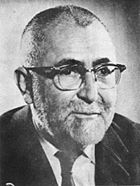Badiozzaman Forouzanfar
Badi'ozzamān Forūzānfar | |
|---|---|
بدیعالزمان فروزانفر | |
 Badǐ'ozzamān Forǔzānfar | |
| Born | July 12, 1904[citation needed] |
| Died | May 6, 1970 (aged 65) |
| Nationality | Iranian |
| Occupation | Scholar |
| Known for | Scholar of Persian literature, Iranian linguistics and culture, and an expert on Molana (Rumi) and his works |
Badiozzaman Forouzanfar or Badi'ozzamān Forūzānfar (Persian: بدیعالزمان فروزانفر, also Romanized as "Badiʿ al-Zamān Furūzānfar"; born 12 July 1904[1] in Boshrooyeh, Ferdows County – died 6 May 1970 in Tehran, born Ziyaa' Boshrooye-i ضياء بشرويهای) was a scholar of Persian literature, Iranian linguistics and culture, and an expert on Rumi (Molana Jalaleddin Balkhi) and his works. He was a distinguished professor of literature at Tehran University.
He is one of the "Five-Masters (Panj Ostād), five influential scholars of Persian literature, the others being Malekoshoara Bahar, Jalal Homaei, Abdolazim Gharib and Rashid Yasemi.
The critical edition of Rumi's Diwan-e Shams-e Tabrizi (in 10 volumes) by Forouzanfar is the best edition of the book available to date.[2][3] The first critical edition of Fihi ma fihi was also done by B. Forouzanfar, which is now well known in the West thanks to the selective translation of A. J. Arberry. His Ahadith-i Mathnawi is a compilation of hadith from Rumi's Masnavi.[4]
He was also a first cousin (maternal) of another famous Iranian scholar of literature, Professor Mohammad Parvin Gonabadi.
Notable students
[edit]See also
[edit]- Persian literature
- Rumi (Molana)
- Five-Masters
References
[edit]- ^ There is conflicting information as to the date of birth of Foruzānfar. The year 1276/1897 is given in a special issue of the academic magazine of the University of Teheran in his memory: Anduhğarawi Hossein. "Ostād-e ostādān", p. 1 in: Majalle-ye Dāneškade-ye Adabiyāt wa 'Olum-e Ensāni. Be yād-e ostād Badi'ozzamān-e Foruzānfar. Sāl-e 22, šomāre-ye 1 (89). Tehrān, 1354 (1975): publication of the University of Tehran, [530] pp. varia. The exact date: 14.07.1276=4.09.1897 on: fa.wikipedia. But "c. 1903" on: http://www.iranicaonline.org/articles/foruzanfar. It is not clear, where this date of 12.07.1904 comes from.
- ^ Mafi, Maryam; Kolin, Azima Melita (December 6, 1999). "Rumi: Whispers of the Beloved" – via Amazon.
- ^ "Iransaga - Jalal al-Din Rumi's Works". www.art-arena.com. Retrieved 2019-11-13.
- ^ Furúzánfar, Badí'al-Zaman. Aḥádíth va qiṣaṣ-i Mathnaví: talfiq-í az du kitáb-i ‘Aḥádíth-i Mathnaví' va 'Ma'ákhidh-i qiṣaṣ va tamthílát-i- Mathnaví. Ed: Ḥusayn Dávúdí. 2nd edition. Amír Kabír, Tehran, 1381 (2002) (orig: 1334/1955).
- Iranian literary scholars
- Linguists from Iran
- Academic staff of the University of Tehran
- People from Ferdows County
- 1970 deaths
- 1904 births
- Members of the Academy of Persian Language and Literature
- People from Boshruyeh
- Iranian biographers
- Iranian lexicographers
- 20th-century linguists
- Scholars of Persian literature
- 20th-century lexicographers
- Asian linguist stubs
- Iranian academic biography stubs
